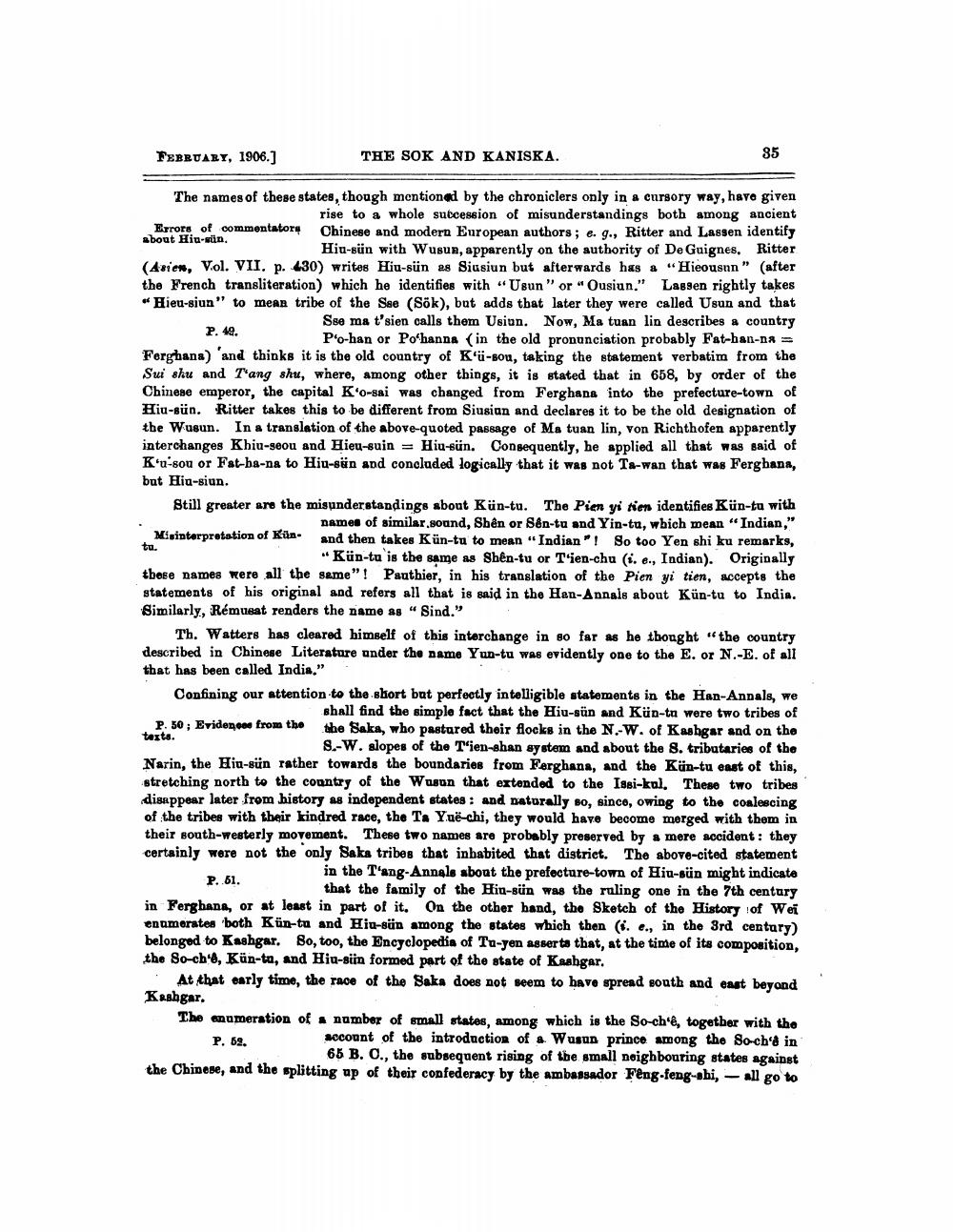________________
FEBRUARY, 1906.]
THE SOK AND KANISKA.
The names of these states, though mentioned by the chroniclers only in a cursory way, have given
rise to a whole succession of misunderstandings both among ancient Errors of commentatore Chinese and modern European authors; e. g., Ritter and Lassen identity about Hiu-sün.
Hiu-sün with Wusun, apparently on the authority of De Guignes, Ritter (Asien, Vol. VII. p. 430) writes Hiu-sün as Siusiun but afterwards has a "Hieousnn" (after the French transliteration) which he identifies with “Usun" or "Ousiun." Langen rightly takes * Hieu-siun" to mean tribe of the Sae (Sök), but adds that later they were called Usun and that
Sse ma t'sien calls them Usiun. Now, Ma tuan lin describes a country P. 49.
Po-han or Poʻhanna (in the old pronunciation probably Fat-ban-nx = Ferghana) 'and thinks it is the old country of K'ü-bou, taking the statement verbatim from the Sui sku and Tang shu, where, among other things, it is stated that in 658, by order of the Chinese emperor, the capital K'o-sai was changed from Ferghana into the prefecture-town of Hiu-sün. Ritter takes this to be different from Siusion and declares it to be the old designation of the Wusun. In a translation of the above-quoted passage of Ma tuan lin, von Richthofen apparently interchanges Khiu-seou and Hieu-suin = Hiu-sün. Consequently, he applied all that was said of K-u-sou or Fat-ba-na to Hiu-sün and concluded logically that it was not Ta-wan that was Ferghana, bat Hia-siun. Still greater are the misunderstandings about Kün-tu. The Pien yi tien identifies Kün-tu with
names of similar.sound, Sbên or Sên-ta and Yin-tu, which mean “Indian," Misinterpretation of Kün and then takes Kün-tu to mean "Indian"! So too Yen shi ku remarks, tu.
Kün-tu is the same as Shên-tu or T'ien-chu (i. e., Indian). Originally those names were all the same"! Pauthier, in his translation of the Pien yi tien, accepts the statements of his original and refers all that is said in the Hen-Annals about Kün-tu to India. Similarly, Rémusat renders the name as "Sind."
Th. Watters has cleared himself of this interchange in so far as he thought "the country described in Chinese Literature ander the name Yun-ta was evidently one to the E. or N.-E. of all that has been called India." Confining our attention to the short but perfectly intelligible statements in the Han-Annals, we
shall find the simple fact that the Hiu-sün and Kün-ta were two tribes of P. 50; Evidence from the the Sake, who pastared their flocks in the N.-W. of Kashgar and on the texts.
S.-W. slopes of the Tien-shan system and about the 8. tributaries of the Narin, the Hin-sün rather towards the boundaries from Ferghana, and the Kün-tu east of this, stretching north to the country of the Wusun that extended to the Issi-kul. These two tribes disappear later from history as independent states: and naturally so, since, owing to the coalescing of the tribes with their kindred race, the Ta Yuë-chi, they would have become merged with them in their south-westerly movement. These two names are probably preserved by a more accident: they certainly were not the only Saka tribes that inhabited that district. The above-cited statement P..61.
in the T'ang-Annals about the prefecture-town of Hiu-sün might indicate
that the family of the Hin-sün was the ruling one in the 7th century in Ferghana, or at least in part of it. On the other hand, tho Sketch of the History of Wei enumerates 'both Kün-tu and Hin-sün among the states which then i. e., in the 3rd century) belonged to Kashgar. So, too, the Encyclopechia of To-yen asserts that, at the time of its composition, the so-ch', Kün-ta, and Hiu-siin formed part of the state of Kashgar.
At that early time, the race of the Saks does not seem to have spread south and east beyond Kashgar. The enumeration of a number of small states, among which is the So-chê, together with the P. 69.
account of the introduction of a Wusun prince among the so-cb'd in
65 B. O., the subsequent rising of the small neighbouring states against the Chinese, and the splitting up of their confederacy by the ambassador Feng-feng-shi, - all go to




